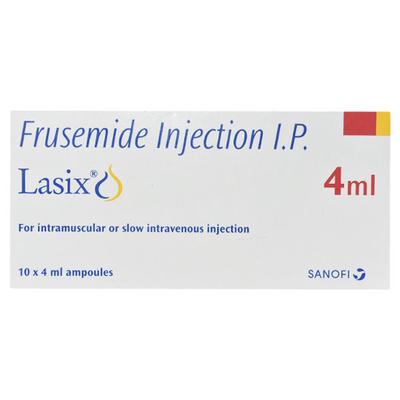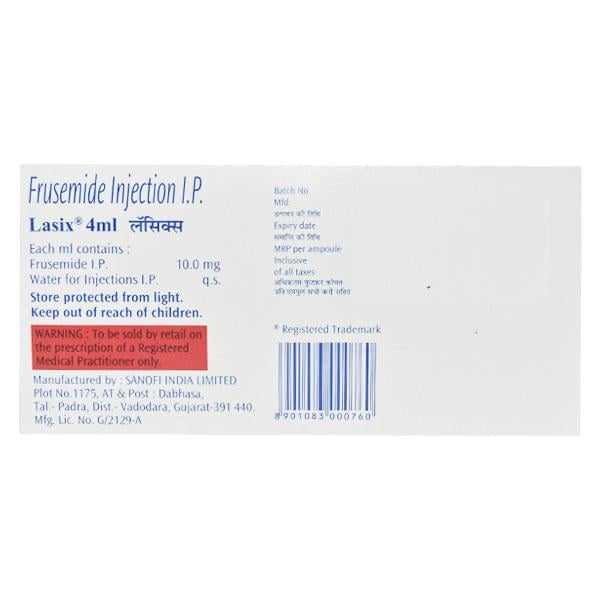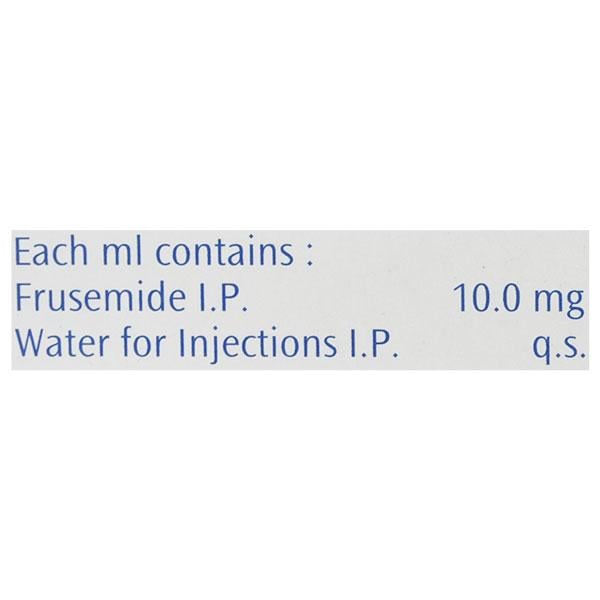

Netmeds First Membership
Quick Links
Introduction About LASIX 40MG INJECTION
LASIX 40MG INJECTION contains frusemide (furosemide) which belongs to the group of medicines called Diuretics. It is used to manage edema (fluid retention) due to problems with heart, lungs, kidneys, liver, blood vessels or high blood pressure. Parenteral administration of LASIX 40MG INJECTION is indicated when a quick and effective removal of excess fluid is required or if the patient cannot take oral medication for any reason. Whenever possible, the patient must be switched to oral medicines in order to avoid unwanted risks of parenteral medication.
During the course of management with LASIX 40MG INJECTION, your doctor will recommend you take several blood tests to monitor your blood sugar and uric acid levels as a precaution to avoid unwanted side effects. They may also monitor your blood potassium and sodium levels carefully, especially if you have vomiting or diarrhea. Before receiving this medicine, inform your doctor if you have any kidney, liver or heart problems. LASIX 40MG INJECTION is not recommended for use in pregnant women unless clearly advised by the doctor and it is not recommended for use in breast-feeding women.
LASIX 40MG INJECTION should be used with caution in children and adolescents (aged under 18 years) under careful medical supervision. Also, it should be used with caution in elderly patients. Consult your doctor before receiving LASIX 40MG INJECTION. The common side effects of receiving LASIX 40MG INJECTION are vomiting, diarrhea, constipation, dry mouth, thirst and feeling of tiredness. Inform your doctor immediately if any of the side effects worsen or persist for a long period of time.
Uses Of LASIX 40MG INJECTION
- Manage edema (fluid retention)
How LASIX 40MG INJECTION Works
LASIX 40MG INJECTION contains frusemide which is a loop diuretic which works by inhibiting the reabsorption of sodium and chloride in the proximal and distal tubules, and in the thick ascending loop of Henle by inhibiting the sodium-chloride cotransport system. As a result, it promotes diuresis (urine output) by enhancing the excretion of water along with sodium, chloride, magnesium and calcium.
How to use LASIX 40MG INJECTION
LASIX 40MG INJECTION will be given to you only by a doctor or nurse into the vein (intravenously) or muscle (intramuscularly). Your doctor will decide the correct dose and duration of LASIX 40MG INJECTION for you depending upon your age, body weight and disease condition.
Side Effects Of LASIX 40MG INJECTION
Uncommon
- Blurred vision
- Sensitivity to light (photosensitivity)
- Feeling of tiredness
- Dry mouth, thirst
- Diarrhea, constipation
- Vomiting
- Deafness
- Lowering of blood pressure (resulting in impaired concentration and reaction, lightheadedness, a feeling of pressure in the head, headache, dizziness, drowsiness, a feeling of weakness, visual disturbances, dry mouth and an inability to stand upright)
Rare
- Crawling sensation on the skin, itching or tingling without any reason
- Hearing disorders and ringing in the ears
- Inflammation of a blood vessel
- Fever, muscle ache
- Inability to control urination
- Increased urine production
- Enlarged prostate or narrowing of the ureters
- Urine production can stop suddenly
- Minor mental disturbances
Inform your doctor immediately if you experience any of the following side effects while receiving LASIX 40MG INJECTION:
- Allergic reactions (signs include skin rash, itching, fever, photosensitivity, red patches on the skin, joint pain, eye inflammation, blisters on the skin, skin peeling and tiny spots from bleeding in the skin)
- Signs of pancreatitis (such as severe pain in the upper abdomen, shifting towards the back)
- Signs of abnormal blood counts (such as mouth ulcers, sore throat, fever, unexplained bruising or bleeding)
- Signs of kidney inflammation (such as pain in lower back or blood in the urine)
- Signs of metabolic acidosis (such as nausea, vomiting, irregular heart rate, chest pain and weakness)
- Shock (signs include severe drop in blood pressure, extreme paleness, restlessness, weak fast pulse and clammy skin impaired consciousness)
How To Manage Side Effects
Constipation
Try to eat more high-fiber foods such as fresh fruit, vegetables, cereals and drink plenty of water. If this does not help, inform your doctor for receiving alternate management for constipation.
Diarrhea
Drink lot of fluids such as water to keep yourself hydrated. Avoid eating high-fat or spicy foods. Inform your doctor if the symptom gets worse.
Dry Mouth
Sip water regularly and other sugar free liquids. Do not use mouthwashes that contain alcohol because they can make your mouth dry, use mouthwash that is used only for dry mouth. Limit your caffeine intake. Inform your doctor if the symptom does not improve.
Nausea And Vomiting
Stick to simple meals while receiving LASIX 40MG INJECTION. Avoid eating oily rich, fried or spicy foods. Do not lie down or sleep immediately after eating. Inform your doctor if the symptom does not improve.
Warning & Precautions
Pregnancy
Monitoring requiredLASIX 40MG INJECTION is not recommended for use in pregnant women unless considered clearly necessary. If it is administered in case of swelling or water retention, the growth of the baby must be regularly monitored. Consult your doctor before receiving LASIX 40MG INJECTION.
Breastfeeding
ContraindicatedLASIX 40MG INJECTION is not recommended for use in breast-feeding women as it passes into the milk and may inhibit the secretion of milk. Consult your doctor before receiving LASIX 40MG INJECTION.
Driving and Using Machines
Use with CautionDo not drive or operate any tools or machines if you are not alert as usual after receiving LASIX 40MG INJECTION.
Alcohol
Consult your doctorAvoid consumption of alcohol while receiving LASIX 40MG INJECTION as it may lead to excessive lowering of blood pressure.
Kidney
Consult your doctorLASIX 40MG INJECTION is not recommended for use in patients having kidney failure. It should be used with caution in patients with kidney problems. Consult your doctor before receiving LASIX 40MG INJECTION.
Liver
Consult your doctorLASIX 40MG INJECTION is not recommended for use in patients having severe liver problems (cirrhosis). It should be used with caution in patients with liver problems. Consult your doctor before receiving LASIX 40MG INJECTION.
Allergy
ContraindicatedDo not receive LASIX 40MG INJECTION if you are allergic to frusemide (furosemide) or sulphonamide antibiotics (such as sulfadiazine).
Heart Disease
Use with CautionLASIX 40MG INJECTION should be used with caution in patients with low blood pressure. Consult your doctor before receiving LASIX 40MG INJECTION.
Use In Pediatrics
Use with CautionLASIX 40MG INJECTION should be used with caution in children and adolescents (aged under 18 years) under careful medical supervision. Your child’s doctor may adjust the dose on the basis of the severity of the renal insufficiency and on the response to initial doses. Consult your child’s doctor for advice before administration of LASIX 40MG INJECTION .
Use In Geriatrics
Use with CautionLASIX 40MG INJECTION should be used with caution in elderly patients. Consult your doctor before receiving LASIX 40MG INJECTION.
Others
LASIX 40MG INJECTION is not recommended for use if you:
- Have a low blood volume or severely dehydrated (with or without accompanying low blood pressure)
- Have too little potassium or sodium in your blood (shown in blood test)
- Are not passing any water (urine)
- Have addison's disease
- Have porphyria (characterized by abdominal pain, vomiting or muscle weakness)
Before receiving LASIX 40MG INJECTION, inform your doctor if you:
- Feel dizzy when you are standing up
- Are dehydrated (water loss due to vomiting, diarrhea, passing urine often and trouble drinking or eating)
- Have difficulty in passing water (due to an enlarged prostate)
- Have diabetes
- Have gout (painful or inflamed joints)
- Have low blood protein levels (hypoproteinaemia)
- Have raised levels of calcium in the blood
Interactions
A. Drug-Drug Interactions:
Before receiving LASIX 40MG INJECTION, inform your doctor if you are taking any of the following medicines:
- Medicines used to manage irregular heartbeat (Ex. digoxin, amiodarone, sotalol, dofetilide and ibutilide)
- Medicines used to reduce high blood pressure such as thiazide diuretics (Ex. bendroflumethiazide or hydrochlorothiazide), ACE inhibitors (Ex. lisinopril) or angiotensin II-receptor blockers (Ex. losartan)
- Medicines used to reduce high cholesterol levels in blood (Ex. clofibrate, colestyramine and colestipol)
- Medicines used to manage diabetes (Ex. insulin and metformin)
- Non-steroidal anti-inflammatory medicines (Ex. aspirin or celecoxib)
- Corticosteroids (used to manage pain or inflammation) Ex. dexamethasone, prednisolone
- Medicines used to manage stomach ulcers (Ex. sucralfate or carbenoxolone)
- Medicines used to manage epilepsy (Ex. phenytoin, carbamazepine or phenobarbital)
- Antibiotics (used to manage bacterial infections) such as aminoglycosides (Ex. streptomycin), cephalosporins, polymyxins or quinolones
- Medicines used to increase blood pressure (Ex. tyramine, tryptamine, and phenylethylamine)
- Laxatives (used to manage constipation) Ex. lactulose, polyethylene glycol
- Skeletal muscle relaxants given during operations (Ex. tubocurarine, curarine derivates and succinylcholine)
- Chloral hydrate (used to induce sleep)
- Lithium (used to manage mental illness)
- Theophylline (used to manage asthma)
- Immunosuppressants (used to suppress immune system) Ex. tacrolimus, sirolimus
- Iodinated contrast media (used during diagnostic techniques)
- Foscarnet (used to manage cytomegalovirus retinitis)
- Pentamidine (used to manage or manage pneumonia)
- Probenecid (used to manage gout)
- Organoplatins (used to manage certain type of cancer)
- Methotrexate (used to manage severe arthritis or some forms of cancers)
- Aminoglutethimide (used to manage cushing´s syndrome)
- Risperidone (used to manage mental disorders)
- Sorbitol (used as a sugar substitute in diabetic patients)
Overdosage:
LASIX 40MG INJECTION will be administered to you only by a doctor or a nurse in a hospital, and so it is unlikely to receive an overdose. However, consult your doctor if you experience any unusual symptoms such as massive diuresis resulting in dehydration, volume depletion and electrolyte disturbances with consequent hypotension and cardiac toxicity. In high doses it may cause transient deafness and may precipitate gout (disturbed uric acid secretion).
Synopsis
| Drug | : | Frusemide (furosemide) |
| Pharmacological Category | : | Diuretics |
| Therapeutic Indication | : | Fluid retention (edema) |
| Dosage Forms | : | Injection, Tablet, Oral Solution |
More Information
Storage
- Do not store LASIX 40MG INJECTION above 25°C
FAQs About LASIX 40MG INJECTION
Q: What is LASIX 40MG INJECTION and why is it prescribed?
A: LASIX 40MG INJECTION contains frusemide (furosemide) which belongs to the group of medicines called Diuretics. It is used to manage edema (fluid retention) due to problems with your heart, lungs, kidneys, liver, blood vessels or high blood pressure.
Q: Will LASIX 40MG INJECTION make me feel tired?
A: LASIX 40MG INJECTION may cause hypotension (decrease in blood pressure) in some individuals and feeling of extreme tiredness or fainting can be attributed to this. Consult your doctor if you experience any unusual symptoms after receiving LASIX 40MG INJECTION.
Q: Will LASIX 40MG INJECTION increase the urge to pass urine?
A: No, although LASIX 40MG INJECTION acts by increasing urine output, it only increases the frequency of urine output and not the urge to pass urine. Consult your doctor if you experience any symptoms of urinary incontinence or if you have any bladder problems.
Q: Can LASIX 40MG INJECTION be used in pregnant women?
A: LASIX 40MG INJECTION is not recommended for use in pregnant women unless clearly advised by the doctor. If it is administered in case of swelling or water retention, the growth of the baby must be regularly monitored. Consult your doctor before receiving LASIX 40MG INJECTION.
Q: How LASIX 40MG INJECTION will be given?
A: LASIX 40MG INJECTION will be given to you only by a doctor or nurse into the vein (intravenously) or muscle (intramuscularly). Your doctor will decide the correct dose and duration of LASIX 40MG INJECTION for you depending upon your age, body weight and disease condition.
References
1. KD. Tripathi. Diuretics. Essentials of medical pharmacology. Seventh edition. 2013. Page – 579-581.
2. Robert F. Reilley and Edwin K. Jackson. Regulation of renal function and vascular volume. Goodman & Gilman’s: The Pharmacological basics of Therapeutics. 12th Edition. New York McGraw Hill Medical 2011. Page – 682-686.
3. University of Pennsylvania. Furosemide for Accelerated Recovery of Blood Pressure Postpartum (ForBP). NIH U.S. National Library of Medicine ClinicalTrials.gov. [Revised in September 2020] [Accessed on 8th February 2023] https://clinicaltrials.gov/ct2/show/NCT03556761
4. Nisha A.Gilotra Oluseyi Princewill, Bonnie Marino Ike S.Okwuosa, Jessica Chasler, Johana Almansa, Abby Cummings, Parker Rhodes, Julianne Chambers, Kimberly Cuomo, Stuart D.Russell. Efficacy of Intravenous Furosemide Versus a Novel, pH-Neutral Furosemide Formulation Administered Subcutaneously in Outpatients With Worsening Heart Failure. ScienceDirect. January 2018. [Accessed on 8th February 2023] https://www.sciencedirect.com/science/article/pii/S2213177917306856#!
5. B. Braun Melsungen AG. Electronic Medicines Compendium (EMC). [Revised in May 2022] [Accessed on 8th February 2023] https://www.medicines.org.uk/emc/files/pil.14419.pdf
6. American Regent, Inc. U.S. Food & Drug Administration. [Revised in June 2011] [Accessed 8th February
Useful Diagnostic Tests
- Kidney Function Test












